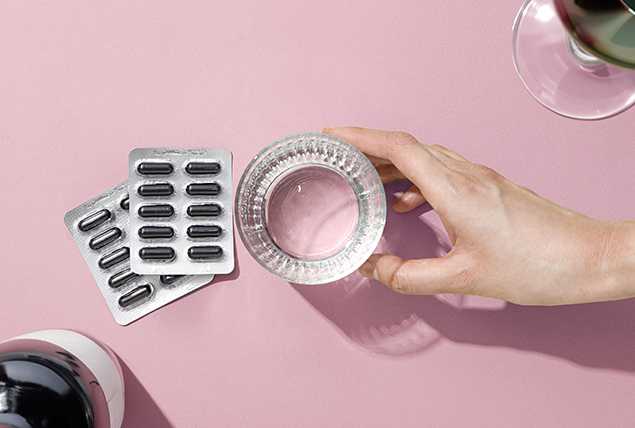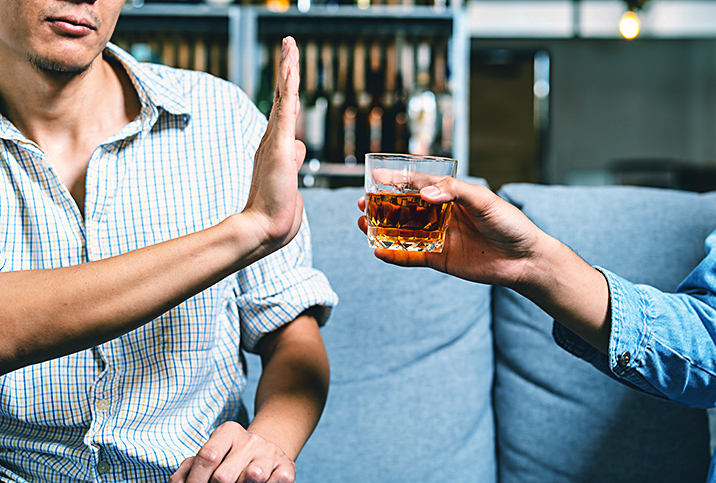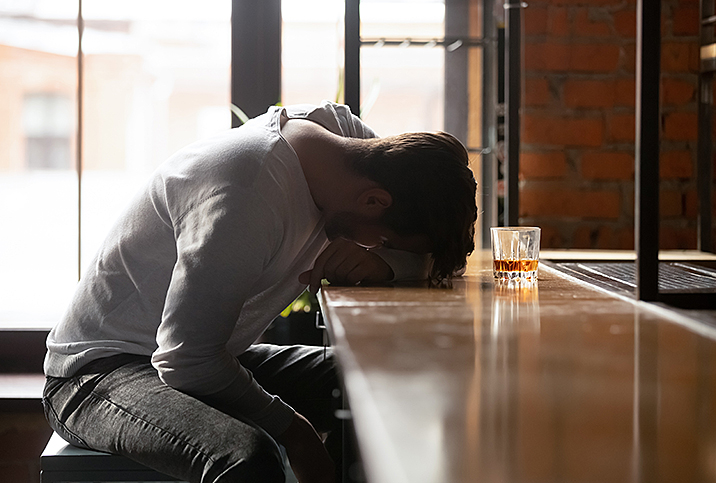Can You Take Activated Charcoal to Avoid a Hangover?

Key Points
- Activated charcoal is most often used to treat poisoning or overdose because of its ability to bind toxins and chemicals in the digestive system.
- That's led some people to believe it could be a hangover cure.
- Activated charcoal is not the answer, unfortunately, as the medical community has yet to find such a cure.
What if there was a magic pill you could take to prevent hangovers when you're drinking too much alcohol? Some people already swear by activated charcoal. This allegedly magical elixir appears in everything from beauty products and juice cleanses to supplements, beverages and ice cream.
Are these "natural" detoxing remedies safe, or are they another health fad? What are the side effects? Aside from drinking less, are there any natural ways to prevent a hangover?
What is activated charcoal?
"Activated charcoal is a fine black powder made of wood, coconut shells or peat that has been heated to create pores in the charcoal's structure," said Catherine Gervacio, R.N.D., a registered nutritionist dietician in the Philippines.
Activated charcoal is not charcoal briquettes (the kind of charcoal you cook with).
While both charcoals are made from the same basic material, their compositions and functions differ. Activated charcoal is so named because it is activated with oxygen at very high temperatures. Doing so produces a fine black powder used as a supplement or an additive to foods and nonfood products, said Eva De Angelis R.D.N., a registered dietician nutritionist based in Buenos Aires, Argentina.
What is activated charcoal used for?
Activated charcoal is specifically treated to enhance its absorption properties. It's mainly used for its ability to bind toxins and chemicals in the digestive system.
This prevents these chemicals from absorbing into the bloodstream, which is why activated charcoal is used for certain medical and detoxification purposes, said Kevin Huffman, D.O., a bariatric physician and the CEO and founder of online food shop Bariatric Food Source in Elyria, Ohio.
"Activated charcoal is often utilized in cases of poisoning or overdose as it can help reduce the effects of ingested toxins," Huffman said.
Activated charcoal might be used as an alternative for ipecac-induced vomiting or stomach pumping to treat critical poisonings and overdoses. Now, it is available over the counter and used by some to treat and prevent hangovers, which is a subject of debate with limited scientific evidence, Gervacio said.
Does taking activated charcoal prevent a hangover?
Does activated charcoal absorb alcohol?
Alcohol contributes to around 3 million deaths worldwide per year, or 5 percent of all deaths annually. The causes of alcohol-related deaths include alcohol poisoning, liver damage, heart failure, cancer and car accidents, a 2022 report indicated.
Could activated charcoal play a role in reducing the impact of alcohol-related deaths?
Activated charcoal can help treat moderately severe to life-threatening intoxication, a 2019 study suggested, but more research is needed.
"Theoretically, the charcoal absorbs some of the byproducts of alcohol metabolism in the digestive tract, but still, further studies are yet to be conducted to prove its effectiveness," Gervacio said.
It is not intended for use as a simple hangover remedy, and activated charcoal did not significantly change plasma alcohol concentrations in a 1986 study.
"Some individuals have embraced activated charcoal as a potential preventive measure against the effects of consuming alcohol," Huffman said. "However, it is crucial to note that its effectiveness in mitigating these effects is limited and should not be relied upon as a substitute for responsible drinking practices."
Recommended
- Please Stop Believing These 'Whiskey Dick' Inaccuracies: Alcohol-induced erectile dysfunction isn't only about whiskey, and it's very real.
- Demon in a Bottle: Alcohol Use Disorder: This chronic brain disease can lead to serious consequences for your health and sex life.
- How Much Alcohol Is Too Much?: Responsible drinking can become second nature once you understand the facts and benefits.
Are there any benefits to taking activated charcoal before drinking alcohol?
This type of charcoal can help with a relatively large list of toxic ingestions. Whether someone took too much aspirin, asthma or anti-seizure medication, activated charcoal may help.
Activated charcoal is not effective for the following toxins because it will not prevent the poisons from being absorbed by the body, according to Mayo Clinic:
- Corrosive agents
- Strong acids
- Iron
- Boric acid
- Lithium
- Petroleum products (such as paint thinner or fuel oil)
- Swallowed alcohols
Activated charcoal is best used in an emergency regarding certain toxins. It is the most widely used form of gastrointestinal decontamination in emergency rooms. Over-the-counter activated charcoal is not used at the same level as an emergency room product, according to Poison Control.
If you combine activated charcoal with a nutritious beverage, the charcoal will bind to the vitamins and minerals and prevent absorption. Drink something healthy to help hydrate, but you might want to skip the addition of activated charcoal.
What are the potential risks of taking activated charcoal?
Activated charcoal is best reserved for acute poisoning from specific substances. A single dose of activated charcoal does have a low risk of pulmonary aspiration, according to a 2016 study.
Activated charcoal can interfere with the absorption of medications and nutrients, which could be a concern for individuals taking regular medications or with specific dietary needs, Gervacio said.
The side effects of taking activated charcoal can include the following:
- Poor absorption of nutrients
- Negative interaction with antibiotics
- Interference with antidepressants
- Constipation
- Bowel blockage
- Black stools
- Black tongue
- Vomiting
- Diarrhea
What are the natural ways you can help reduce the risk of a hangover?
The best natural way to reduce the risk of a hangover is to drink in moderation, limiting the amount of alcohol you're consuming.
"While drinking, alternating alcoholic beverages with water can help maintain hydration levels. Also, it's best to eat a balanced meal before drinking to help slow the absorption of alcohol," Gervacio said.
Alcoholic drinks that may result in a less severe hangover are beverages lower in congeners, or minor compounds that color and flavor alcohol. Clear liquors such as vodka and gin tend to cause fewer hangovers than dark alcohol, such as whiskey and red wine.
Congeners vary between alcohol types, too, such as bourbon compared to whiskey.
It can take fewer drinks with a higher concentration of congeners to get a hangover, and the severity of the hangover is worse, a 2023 report indicated.
The main form of alcohol in alcoholic beverages is ethanol, but darker liquors include chemically related compounds or congeners—methanol is one—that have especially toxic metabolites and cause worse hangovers, according to a 2023 report.
What are natural ways to help you get over a hangover?
When we have too much to drink, our bodies respond with symptoms such as the following:
- Dehydration
- Fatigue
- Weakness
- Sensitivity to light and sound
- Headaches
- Dizziness
These symptoms can last several hours or until the following day, De Angelis said.
As for the best hangover cure? Hydrate, hydrate, hydrate. A few other tips and tricks can help, as well.
"Always focus on hydration. Drink water, coconut water or electrolyte-rich beverages to replenish lost fluids. Consume easily digestible foods like fruits, vegetables and whole grains," Gervacio said.
Exercise
Engaging in moderate physical activity, such as a brisk walk, can improve circulation. This can reduce the feeling of sluggishness, a common symptom of a hangover, Huffman said.
If you have the energy, working out boosts the oxygen flow to the brain, which increases mood-boosting hormones to help treat your hangover, according to De Angelis.
Exercise can help stimulate blood flow and your metabolism to help naturally eliminate alcohol's toxins.
Drinking water
Dehydration is a common hangover symptom. It's especially important to keep yourself hydrated if you're exercising to reduce your hangover, Gervacio said.
You need to replace the electrolytes you lost by drinking. The best way to do this is to drink plenty of water or electrolyte-rich coconut water before you go to bed and as soon as you wake up.
"These minerals will help you regulate and control the balance of fluids in your body," De Angelis said.
Eat fruit
Fruits are good to eat when you wake up with a hangover. Some evidence indicates the natural sugars in fruit might help remove alcohol from your system. Fruits are another source of electrolytes and water, De Angelis said.
Some of the best fruits for a hangover remedy include the following:
- Bananas
- Mangos
- Grapes
- Oranges
- Pears
- Watermelon
- Blueberries
Eat carbohydrates
Carbohydrates can help restore the body's energy levels, given that alcohol can interfere with blood sugar levels and glucose metabolism. This can lead to fatigue, irritability and weakness. Foods rich in carbohydrates can help give the body an immediate energy boost, according to De Angelis.
"Don't reach for the highly processed options as this can lead to blood sugar spikes. It's best to combine high-carb foods, especially complex ones, with some protein for more nourishment and satiety," De Angelis said. "Things like veggies with nut butter, yogurt with fruits and granola, or soup with some chicken and noodles."
Eat foods with zinc and B vitamins
Social drinkers who have a higher dietary intake of zinc had significantly less severe hangovers, according to a 2019 study. Zinc helps metabolize alcohol, while B vitamins can help produce energy and detox the body, Huffman said.
It is best to get these vitamins from food instead of supplements, De Angelis said. Foods rich in zinc and B vitamins include the following:
- Eggs
- Lean meats
- Whole grains
- Dark leafy greens, such as spinach and kale
- Fish
- Poultry
- Nuts
- Seeds
- Greek yogurt
Take nonsteroidal anti-inflammatory drugs (NSAIDs)
Nonsteroidal anti-inflammatory drugs (NSAIDs) such as ibuprofen can help alleviate headaches and body aches associated with hangovers.
"However, it is important to use them sparingly and with caution as they may irritate the stomach lining, which could already be sensitive after alcohol consumption," Huffman said.
The bottom line
No, you shouldn't take activated charcoal after a night of drinking alcohol. The best way to avoid hangovers is to drink in moderation and hydrate.
If you get a hangover, try a little light exercise, hydration and vitamin-rich foods to help you wait it out.


















